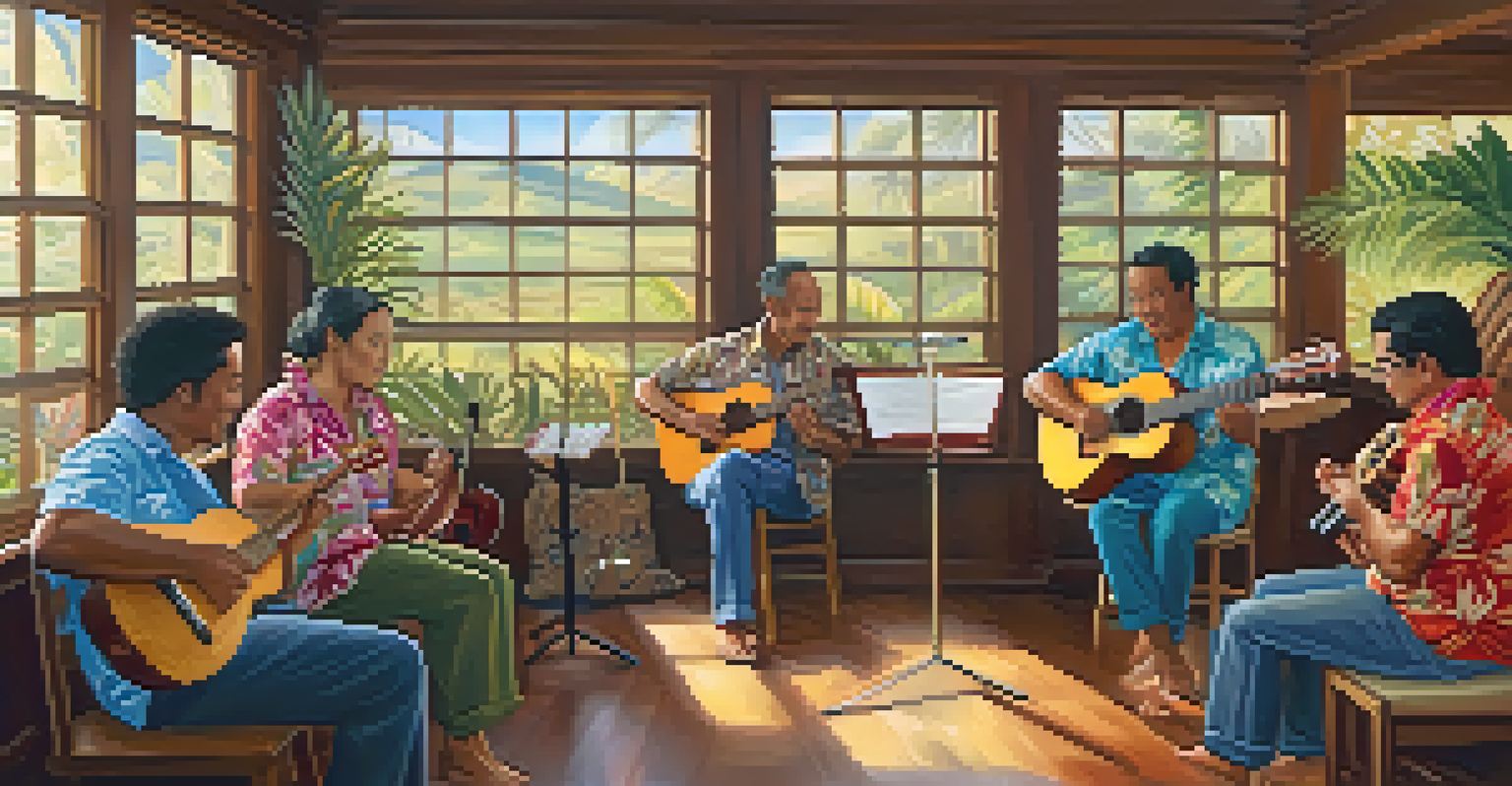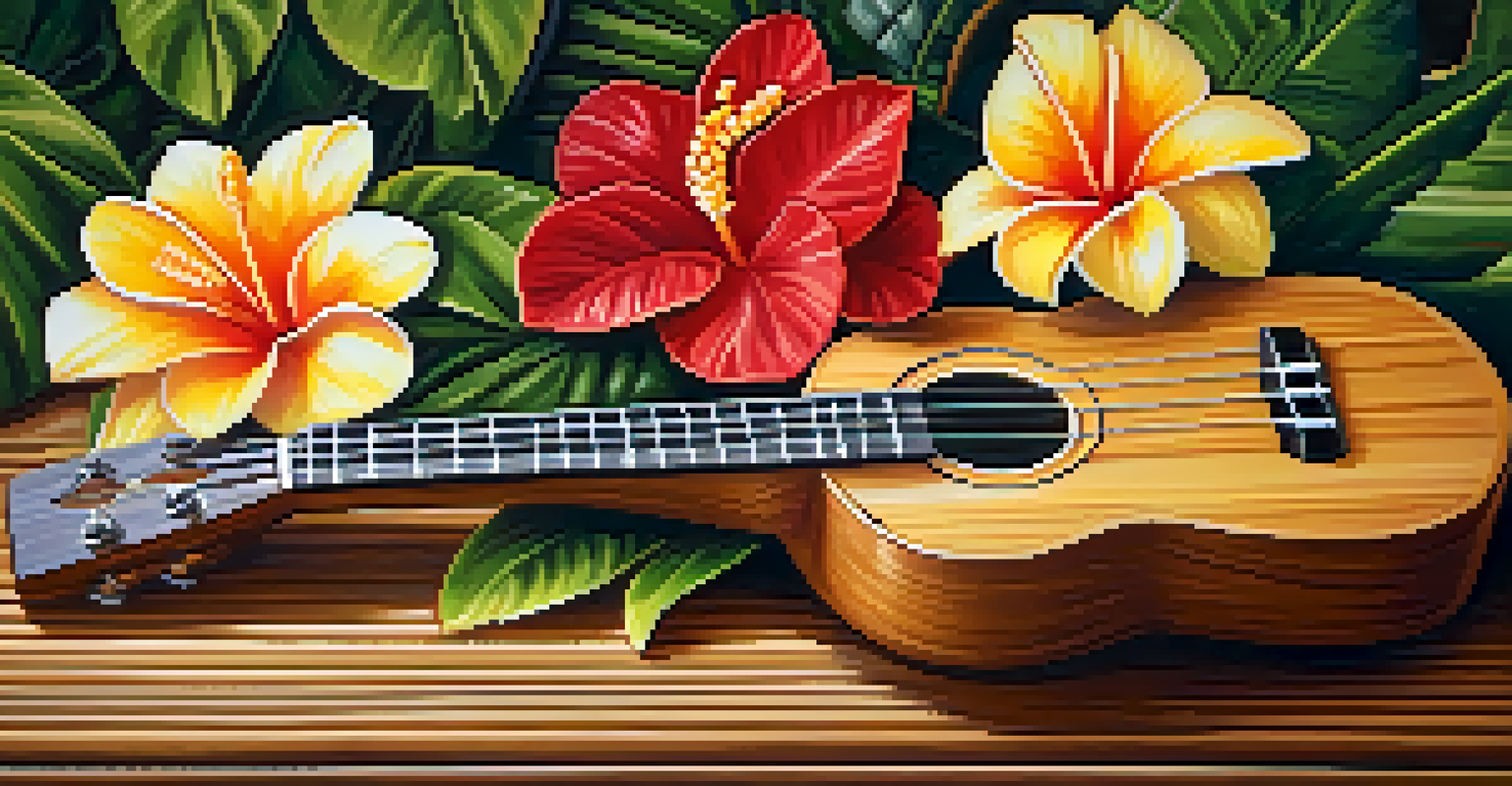Traditional Hawaiian Songs: The Ukulele's Musical Influence

The Roots of Traditional Hawaiian Music
Traditional Hawaiian music is deeply intertwined with the islands' culture and history. It serves as a form of storytelling, capturing the essence of Hawaiian life, mythology, and the natural beauty of the islands. Instruments like the ukulele and slack-key guitar have played a pivotal role in creating the distinct sounds that define this genre.
Music is the shorthand of emotion.
Hawaiian music often includes chants known as 'mele,' which are used to honor people, places, and significant events. These chants can be rhythmic and melodic, weaving together language and music in a way that resonates with listeners. Through melodies and lyrics, they preserve the rich history and traditions of the Hawaiian people.
The combination of vocal harmonies and instrumental rhythms creates a unique auditory experience that transports the listener to the islands. This cultural heritage is not just about entertainment; it's about connection and community, reinforcing the bond among those who share in the experience.
The Ukulele: A Symbol of Hawaiian Culture
The ukulele is often seen as the heart and soul of Hawaiian music, embodying the spirit of the islands. Originally introduced by Portuguese immigrants in the 19th century, it quickly became a beloved instrument among Hawaiians, blending seamlessly into their musical traditions. Its cheerful sound and portability make it a perfect instrument for both casual gatherings and formal performances.

Unlike other string instruments, the ukulele has a light, bright tone that evokes feelings of joy and relaxation. This is why you’ll often find it accompanying hula dancers, adding an enchanting layer to their performances. The soft strumming can transport listeners to a beachside luau, creating a vivid picture through sound.
Hawaiian Music: A Cultural Legacy
Traditional Hawaiian music serves as a vital connection to the islands' culture and history, embodying storytelling through melodies and chants.
Moreover, the ukulele's role has expanded beyond traditional Hawaiian music. Today, it is embraced by musicians worldwide, influencing various genres and inspiring countless artists. Its versatility allows it to adapt to different musical styles, making it a bridge between cultures.
The Influence of Traditional Hawaiian Songs on Modern Music
Traditional Hawaiian songs have significantly impacted modern music, echoing through various genres and influencing artists globally. From folk to pop, the melodic structures and themes of Hawaiian music can be heard in contemporary tunes. Musicians often draw inspiration from the storytelling aspect of traditional songs, weaving personal narratives into their music.
The ukulele is a symbol of the spirit of Aloha.
For instance, artists like Jack Johnson and Jason Mraz incorporate elements of Hawaiian music into their sound, showcasing the ukulele's charm. Their songs often reflect laid-back vibes and positive messages, reminiscent of the island lifestyle. This fusion helps to popularize Hawaiian culture while introducing new audiences to its rich musical heritage.
Moreover, the resurgence of interest in acoustic and folk music has brought Hawaiian melodies back into the spotlight. As more people explore the ukulele, they often stumble upon traditional songs that resonate with their own experiences. This cross-pollination of music styles emphasizes the timeless appeal of Hawaiian music and its ability to connect people across generations.
The Role of the Ukulele in Hawaiian Storytelling
In Hawaiian culture, storytelling is a cherished tradition, and the ukulele plays a vital role in this art form. Songs often serve as a medium to convey stories about gods, ancestors, and the beauty of the islands. Through these narratives, the ukulele helps preserve Hawaiian history and cultural identity.
As performers strum their ukuleles, they share tales that evoke strong emotions and paint vivid images in the minds of listeners. The interplay between music and storytelling creates an immersive experience, allowing the audience to feel the essence of Hawaiian life. Each note and lyric draws listeners deeper into the narrative.
Ukulele: Heart of Hawaiian Sound
The ukulele, a symbol of Hawaiian culture, plays a crucial role in both traditional and modern music, bridging various genres and connecting communities.
This unique blend of music and storytelling ensures that Hawaiian culture remains alive and relevant. By passing down these songs through generations, the ukulele becomes a vessel for history, connecting the past with the present and inspiring future storytellers to keep the tradition alive.
The Evolution of Hawaiian Music and the Ukulele
Hawaiian music has evolved over the years, influenced by various cultures and musical styles. The introduction of different instruments and genres has shaped the sound of traditional Hawaiian songs, creating a beautiful tapestry of musical expression. The ukulele, in particular, has adapted alongside these changes, maintaining its significance in the evolving landscape of Hawaiian music.
In the early 20th century, Hawaiian music gained international recognition, particularly through the popularity of the 'Hawaiian Renaissance.' This movement celebrated traditional music while incorporating elements of jazz and swing. The ukulele became a staple in this era, showcasing its versatility and charm in a broader musical context.
As music continues to evolve, the ukulele remains a beloved instrument, bridging the gap between traditional and contemporary styles. Its ability to adapt while preserving the essence of Hawaiian music ensures that it will continue to be a vital part of the islands' cultural identity for years to come.
Learning the Ukulele: Connecting with Hawaiian Culture
Learning to play the ukulele is not just about mastering an instrument; it's a gateway to understanding and connecting with Hawaiian culture. Many people find joy in picking up the ukulele as a way to immerse themselves in the melodic world of traditional Hawaiian songs. This journey often begins with simple chords and strumming patterns, making it accessible for beginners of all ages.
As learners progress, they discover the stories behind the songs and the cultural significance of the music. This deeper understanding fosters appreciation for Hawaiian traditions and encourages a sense of community among those who play. Group classes and jam sessions can create bonds, as participants share their love for music and culture.
Preserving Hawaiian Traditions Today
The ongoing celebration of Hawaiian music, through festivals and innovation, ensures its vibrant legacy remains alive for future generations.
Moreover, online resources and local workshops have made it easier than ever to learn the ukulele. As enthusiasts dive into Hawaiian music, they can explore different genres and styles, enriching their musical experience. This journey not only enhances their skills but also deepens their connection to the vibrant culture of Hawaii.
Celebrating Hawaiian Music Today and Tomorrow
Today, Hawaiian music continues to thrive, with a resurgence of interest in traditional songs and the ukulele. Numerous festivals and events celebrate this rich cultural heritage, bringing together musicians and audiences from around the world. These gatherings serve as a reminder of the importance of preserving traditional music while embracing innovation.
Artists are experimenting with new sounds, blending Hawaiian melodies with various genres, which keeps the music fresh and relevant for new generations. This fusion not only attracts younger audiences but also inspires them to explore their roots and discover the beauty of Hawaiian culture. The ukulele remains a central figure in these musical explorations.

As we look to the future, the preservation and celebration of Hawaiian music will continue to depend on community involvement and education. By fostering a love for traditional songs and the ukulele, we ensure that this beautiful aspect of Hawaiian culture remains vibrant and alive for generations to come.